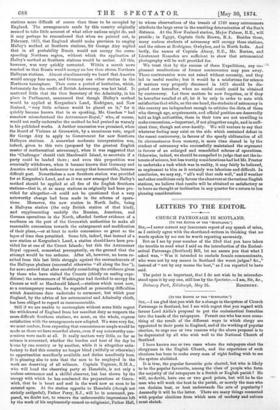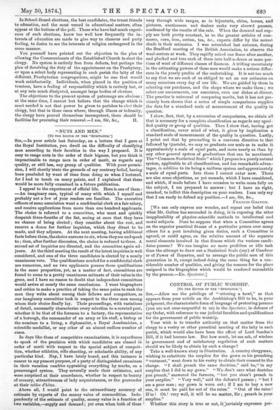[TO THE EDITOR OF THE "SPECTATOR. "] SIR, -I am glad that
you wish for a change in the system of Church Patronage in Scotland, but I see with regret that you regard with favour Lord Airlie's proposal to put the ecclesiastical franchise into the hands of the ratepayers. Permit one who has seen some- thing of the result of the different ways in which clergy are appointed to their posts in England, and of the working of popular election, to urge one or two reasons why the above proposal is to be deprecated by all who wish well to the National Church of Scotland_
I have known one or two cases where the ratepayers elect the clergyman in the English Church, and the experience of such elections has been to make every man of right feeling wish to see the system abolished.
It is true, the popular favourite gets elected, but who is likely to be the popular favourite, among the class of people who form the majority of the ratepayers in a Scotch or English parish? He will, no doubt, have one or two good points, but will he be the man who will work the best in the parish, or merely the man who can declaim beat, or best understands fhe arts of popularity? Assuredly it will be the latter. There are many things connected with popular elections from which men of modesty and culture must shrink. In School-Board election; the best candidates, the truest friends to education, and the most versed in educational matters, often appear at the bottom of the poll. Those who have had much experi- ence of such elections, know too well bow frequently the in- terests of education are made to give way to clamour and party feeling, to desire to see the interests of religion endangered in the same manner.
You yourself have pointed out the objection to the plan of Allowing the Communicants of the Established Church to elect the clergy. No system is entirely free from defects, but perhaps the plan of devolving the duty of the appointment on the Presbytery, or upon a select body representing in each parish the laity of the different Presbyterian congregations, might be one that would work satisfactorily. Individuals, when placed in the position of trustees, have a feeling of responsibility which is entirely lost, or -at any rate much dissipated, amongst large bodies of electors.
The objections to the present system of patronage are obvious ; at the same time, I cannot but believe that the change which is most needed is not that power be given to parishes to elect their clergy, but that in those cases where, through illness or infirmity, the clergy have proved themselves incompetent, there should be facilities for procuring their removal.—I am, Sir, &c.,



































 Previous page
Previous page